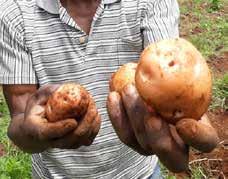
2 minute read
Government body buys rice from farmers in Mwea, Kenya
Government body buys rice worth US $2.8m from farmers in Mwea, Kenya
The Kenya National Trading Corporation (KNTC) has bought rice worth US $2.8m from farmers in Mwea, Kirinyaga County, following the presidential directive issued in March. A kilogram of rice is being bought at US$0.80 (Ksh.85) and farmers have delivered 9m kilos of their produce to their Mwea MultiPurpose Cooperative Society’s stores. Initially, unprocessed rice sold at US $0.42 (Ksh.45).
Advertisement
KNTC Chief Executive Officer Timothy Mirugi said the presidential directive must be implemented and urged the farmers to be patient. When President Uhuru Kenyatta visited Kirinyaga recently, he directed KNTC to buy the rice to protect farmers, who grow the crop at the giant Mwea Irrigation Scheme, from exploitation by brokers.
Protection from brokes
He noted that for decades, farmers had been exploited by middlemen, making it difficult for them to break even. Brokers normally offer between US $0.42(Ksh45) and US $0.47 (Ksh50) per kilogram of rice and farmers had been complaining that the prices were too low. potato seed multiplication program in six counties to address seed shortages that occur perennially. The Agriculture CS Peter Munya said the seeds have been produced under the highest level of genetic control to ensure they are pure and accurately represent the variety characteristics identified by the breeder during selection. He added that the two-year project intends to add 2,500 metric tonnes of certified potato seeds into the national supply annually. He also explained that the output will be achieved through training of county extension staff on climate-smart potato production practices with an emphasis on revitalizing seed production and distribution. According to media reports, approximately 60 staff from Uasin Gishu, Elgeyo-Marakwet, Bomet, These prices made it difficult for farmers to make profits since the brokers took advantage of lack of markets for their produce to buy the commodity at a throw away price.
Deficits
The Mwea scheme produces 80% of rice consumed in Kenya. However, the production is Nyandarua, Nyeri and Taita-Taveta counties have been trained on the multiplication process. The new seeds, which have been produced by plant breeders at the Kenya Agricultural and Livestock Research Organisation (Kalro), will improve farmers’ access to certified potato seeds. This, in turn, will mitigate the effect of COVID-19 on potato production.
not enough and Kenya has to import more rice to cater for the deficit. Currently the government is constructing the US $188,582 Thiba Dam in Rukenya village, Gichugu Constituency to boost rice farming so that the country can produce enough for its rising population and surplus for
Kenyan government launches potato seed multiplication program to address shortage
The government of Kenya has launched a
export.

Production challenges
Potato farmers in these counties continue to face various production challenges leading to an average production of 10 tonnes per hectare against a potential of 60 tonnes. Conversely, climate change remains a major challenge generally to agriculture, including potato production.
Yara East Africa country manager William Ngeno notes that local potato farmers face numerous challenges, especially lack of quality seeds, which eventually dips their productivity and incomes.
“Most potatoes used by processors in Kenya are imported because the local produce is of poor quality and comes with a lot of defects,” explained Ngeno. To produce high quality tubers, according to him, farmers need good seeds, the right fertiliser and proper crop husbandry.










